
Dev Anand was an Indian actor, writer, director and producer known for his work in Hindi cinema. Anand is considered as one of the greatest and most successful actors in the history of Indian cinema. Through a career that spanned over six decades, he worked in more than 100 films. Anand is a recipient of four Filmfare Awards, including two for Best Actor. The Government of India honoured him with Padma Bhushan, Indian third highest civilian honour in 2001 and with Dadasaheb Phalke Award in 2002.

Suraiya Jamal Sheikh, mononymously known as Suraiya, was an Indian actress and playback singer who worked in Hindi films. In a career spanning from 1936 to 1964, Suraiya acted in over 70 films and sang 338 songs. Regarded among the finest and greatest actresses in the history of Indian cinema, she was known for her strong on-screen portrayals in a variety of genres. Suraiya was the most celebrated actress between the mid- to late 1940s and early 1950s and was paid more than her male counterparts.

Akkineni Laxmi Vara Prasada Rao, known professionally as L. V. Prasad, was an Indian film director, producer, actor, and businessman. He was one of the pioneers of Indian cinema and is the recipient of the Dadasaheb Phalke Award, the highest Award for films in India. In 1980, he was awarded the Raghupathi Venkaiah Award, for his contribution to Telugu cinema.
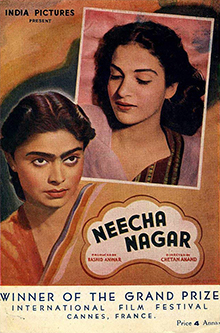
Neecha Nagar is a 1946 Indian Hindi-language film, directed by Chetan Anand, written by Khwaja Ahmad Abbas and Hayatullah Ansari, and produced by Rashid Anwar and A. Halim. It was a pioneering effort in social realism in Indian cinema and paved the way for many such parallel cinema films by other directors, many of them also written by Khwaja Ahmad Abbas. It starred Chetan Anand's wife Uma Anand, with Rafiq Anwar, Kamini Kaushal, Murad, Rafi Peer, Hamid Butt, and Zohra Sehgal. Neecha Nagar was a Hindi film adaptation in an Indian setting of Russian writer Maxim Gorky's 1902 play The Lower Depths.
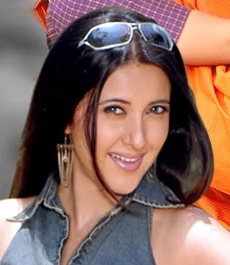
Sakshi Shivanand is an Indian actress, who has appeared in Telugu, Tamil, Kannada, Malayalam and Hindi films. Her most notable work is Aapko Pehle Bhi Kahin Dekha Hai which was directed by Anubhav Sinha and co-starred Priyanshu Chatterjee, Om Puri and Farida Jalal. She has also lent her voice to Cinderella in The Story of Cinderella, an animation television series telecast in India on Just Kids! on Sahara TV.
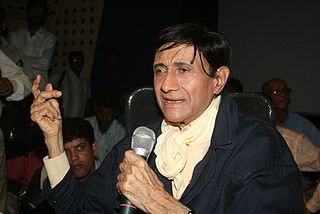
Dev Anand, was an Indian actor, film producer, film director and screenwriter known for his work in Hindi cinema. Anand is considered one of the greatest and most successful actors in the history of Indian cinema. Through a career that spanned over six decades, he worked in more than 100 films. Anand is a recipient of four Filmfare Awards, including two for Best Actor. The Government of India honored him with Padma Bhushan, Indian third highest civilian honour in 2001 and with Dadasaheb Phalke Award in 2002.

Anjali Devi was an Indian actress, model and producer in Telugu and Tamil films. She was well known for her role as the Devi Sita in Lava Kusa as well as for the title roles in movies like Chenchu Lakshmi, Suvarna Sundari and Anarkali.

Ghulam Mustafa Durrani was an Indian radio drama artist, playback singer, actor and music director.

Vedantam Raghavayya was an Indian film director, dance choreographer, and actor known for his work in Telugu and Tamil cinema. An accomplished Kuchipudi dancer, he was honoured with the title "Bharata Kala Prapurna" by the Andhra Pradesh government in recognition of his expertise.
Latha Sethupathi, also known as Latha, is an Indian actress who starred in leading roles in South Indian films from 1973 to 1983. She is also known for her roles in various Tamil television series.
B. A. Subba Rao was an Indian film director, producer, and screenwriter who primarily worked in Telugu cinema. He played a pivotal role in shaping the careers of several prominent actors, including N. T. Rama Rao. Subba Rao made his directorial debut with Palletoori Pilla (1950), a film that launched N. T. Rama Rao in his first lead role and became a major success. He went on to direct other notable films such as Raju Peda (1954), Chenchu Lakshmi (1958), and Bhishma (1962).

Sri Seeta Rama Jananam is a 1944 Indian Telugu-language Hindu mythological film, produced and directed by Ghantasala Balaramayya under the Pratibha Productions banner. The film stars Akkineni Nageswara Rao, Tripurasundari, Vemuri Gaggayya, Rushyendramani. Music was jointly composed by Prabhala Satyanarayana and Ogirala Ramachandra Rao. The film marks the debut of Akkineni Nageswara Rao as a lead actor. It is also the debut of Ghantasala as a chorus singer and in a character role. The film was a commercial failure.
C. H. Narayana Rao was an Indian actor and producer known for his works in Telugu cinema and Telugu theatre. He starred in more than fifty films in a variety of roles. His notable works include classics such as Chenchu Lakshmi (1943), Mugguru Maratilu (1946), Mana Desam (1949), Jeevitham (1950), Veelunama (1965) to name a few.
Rushyendramani was an Indian film actress, playback singer, and dancer from Andhra Pradesh. She had more than 150 films in Telugu, Tamil, Kannada, Malayalam and Hindi films from 1935 to 1986. Her notable films include Sri Seetarama Jananam (1944), Malliswari (1951), Vipra Narayana (1954), Chintamani (1956). Her last film was Sri Shirdi Saibaba Mahathyam (1986).
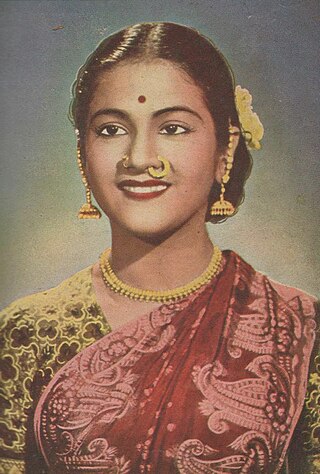
Kumari Kamala is an Indian dancer and actress. Initially featured as a child dancer, Kamala appeared in almost 100 Tamil, Hindi, Telugu and Kannada films throughout her career. In the 1970s, she became a teacher of the Vazhuvoor style of dance in which she specialises.
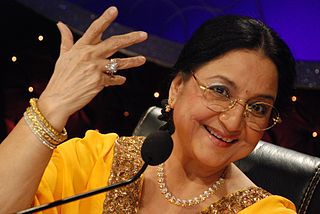
Tabassum, was an Indian actress, talk show host and YouTuber, who started her career as child actor Baby Tabassum in 1947. She later had a television career as the host of first TV talk show of Indian television, Phool Khile Hain Gulshan Gulshan. It ran on National broadcaster Doordarshan from 1972 to 1993, wherein she interviewed film and TV personalities.

Eduruleni Manishi is a 1975 Telugu-language action film directed by K. Bapayya. It stars N. T. Rama Rao and Vanisri, with music composed by K. V. Mahadevan. This film is the debut of Aswini Dutt's Vyjayanthi Movies banner in the film industry. It is a remake of the Hindi film Johny Mera Naam (1970). The film's title was later used as the title of Rama Rao's memoir, by his wife Lakshmi Parvathi.
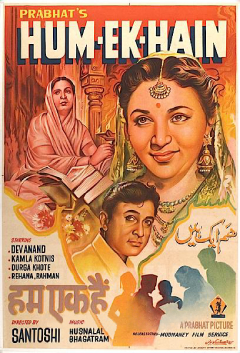
Hum Ek Hain is a 1946 Indian Hindi-language film co-written and directed by P. L. Santoshi in his directorial debut. The film stars Durga Khote, along with Kamala Kotnis, Dev Anand, Rehana and Rehman in their cinematic acting debut. It was released on 8 June 1946.
Hum Ek Hain may refer to:

Bhagyalakshmi is a 1943 Indian Telugu-language drama film directed by P. Pullayya and produced by Chittoor Nagayya. The film features Chittoor Nagayya, Malathi, Doraswamy, Tanguturi Suryakumari, and Giri in key roles. It is notable for being Nagayya’s first production under the Renuka Films banner. Bhagyalakshmi was recognized as the 100th talkie film in Telugu cinema, as noted in a souvenir published by the Film Federation of India to commemorate the silver jubilee of Indian talkies. It did not perform well at the box office.














